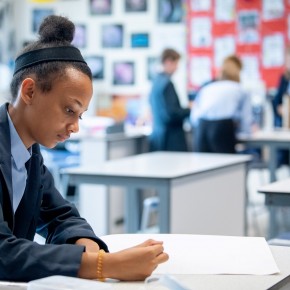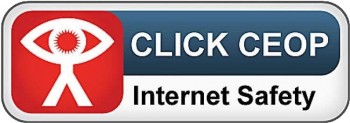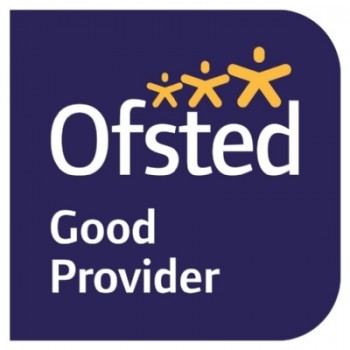Society and Ethics

Society and Ethics Curriculum Map
The aim in Society and Ethics is to create critical thinkers engaging in the big questions that society faces.
The Society and Ethics curriculum is delivered by a dedicated and passionate team, it brings together the subjects previously taught separately as RE, Citizenship and PSHEE. There is now one coherent programme of study, with more time allocated to enable breadth and depth of topics. There will be an unbiased approach to cover a range of different topics; at no point will students be told this is the best or worst political party, the right or wrong religious view, the right or wrong thing to do.
Year 7
Students start with the question Who are we? Where they explore why it important to have an identity and how people preserve their identity; the basic teachings and beliefs of the world’s major faiths and beliefs systems; they also consider how we can understand and respect differences and diversity in school, locally and nationally; Finally, in the Autumn Term students will learn about identity theft, cybercrime and anti-bullying. In the Spring Term Year 7s will investigate the question Do I ever feel a sense of awe and wonder? In this unit they will study what is meant by awe and wonder; spirituality and where this sense of spirituality comes from; learn about different religious denominations; visit local places of worship and think about how we help others, referring to such issues like globalisation, environmental problems and solutions. In the Summer Term students in year 7 will have impartial and independent advice and guidance on careers; analyse religious and non-religious views regarding health and poverty, concluding with a series of lessons related to Sex and Relationship Education which will included body image, puberty, managing our feelings/emotions and staying healthy.
Year 8
In the Autumn Term, Year 8 students investigate the key question how do we live together? Exploring our idea of community; rights and responsibilities and how the criminal justice works in England and Wales, with the impact of religion and religious laws on society today. In the Spring and Summer Terms our students will consider the different authorities in society; with the role of the church and other religious organisations, the role of government in society at a local and national level; the role of the media, charities and science also being studied. In the Spring Term Year 8s will have series of sessions on sex and relationship education, based around the key question of how do I change, looking at: the journey of life for humans from birth to death; relationships, consequences of sexual activity and the social pressures on young people. Students will also look at issues related to raising the awareness of drugs and their effects on individuals, communities and society.
Year 9, 10 & 11 Citizenship
This course is divided into 5 sections
Across Years 9 and 10 students have started a course combining elements of Citizenship, RE and PSHEE which will lead to an Edexcel GCSE in Citizenship Studies. Over the journey of the course students will study and learn about topics across a range of themes including areas related to Religious Studies, Relationship and Sex Education, Drug Education, Careers, Finance / Economics for example. We also use a package called Votes For Schools which allows students to learn about, debate and vote on a topical question, which then feeds into a national voting system for that issue each week.
GCSE Citizenship Studies is about how people take an active part in democratic politics and work together for a better society, locally, nationally and globally. Students will learn about power, democracy, the operation of government and the legal system, and the role of the UK in the wider world. They will explore and learn about different controversial and topical issues with political, social, ethical, economic and environmental dimensions in local to global contexts. They will experience taking citizenship action and learn from trying to make a difference themselves.
The course content is divided into five themes:
Students are introduced to the idea that the UK is a diverse society of many different communities and groups who live together. They explore the nature of identity and multiple identities as well as how and why communities are changing. They consider the democratic rights, freedoms and values that we share, including human rights and the challenge of balancing competing rights. Opportunities for developing citizenship skills include: to debate and explore identities, rights, values and democracy, and to gain a practical understanding of being an active citizen through contributing to local democracy and taking citizenship action to resolve problems, tackle inequality and improve justice.
- B: Democracy at work in the UK
Students explore the idea of representative, parliamentary democracy in the UK including the voting and electoral system, the roles and responsibilities of MPs and how government is organised and kept in check. They will also consider the role of parliament in making and shaping law; the government’s role in managing public money; and how power is organised across the constituent parts of the UK. Opportunities for developing citizenship skills and taking action include: participation in decision making forums and ‘mock’ or real school elections, researching and debating the effectiveness of democracy in the UK, the extension of voting rights to 16 and 17 year olds or further devolution of power versus independence for Scotland, Northern Ireland and Wales.
Students explore why we need laws and how law affects us in our everyday lives. They consider how the justice system in England and Wales works in practice including the roles and power of the police and the courts. They also learn about the distinctive features of the criminal, civil and youth justice systems and some of the different approaches to settling disputes, addressing inequality, changing behaviour and tackling crime in society. Opportunities for developing citizenship skills and taking action include: investigating different legal cases, participation in ‘mock’ trials and sentencing decision-making activities, debating whether it is ever right to break the law or whether the justice system treats everyone fairly. Students could undertake citizenship action or campaigns to address inequality or an injustice.
In this section students revisit key ideas about democracy, rights and responsibilities in Themes A–C as they explore ideas about power. In particular they consider power in relation to the ways in which citizens, governments and the media exercise power and influence in a range of local to global situations. They contrast representative democracy in the UK with a non-democratic political system and the limits this places on the rights and freedoms of citizens. Opportunities to develop citizenship skills include: examining ways in which citizens co-operate to try and improve society and democracy through different kinds of political and citizen actions; practical experiences of taking citizenship action themselves to address issues; debating the relationship of the UK with Europe; and investigating global issues and problems facing society from the environment to humanitarian and conflict situations.
- E: Taking citizenship action
Citizenship action may be defined as a planned course of informed action to address a citizenship issue or question of concern and aimed at delivering a benefit or change for a particular community or wider society. Taking citizenship action in a real out-of-classroom context allows students to apply citizenship knowledge, understanding and skills, and to gain different citizenship insights and appreciate different perspectives on how we live together and make decisions in society. It requires them to practise a range of citizenship skills including: research and enquiry, interpretation of evidence, including primary and secondary sources, planning, collaboration, problem solving, advocacy, campaigning and evaluation.
Taking citizenship action – course requirements
Students must carry out an in-depth, critical investigation leading to citizenship action as described above. The investigation and action can be based on any aspect or issue arising from the course content and should be designed to have an impact locally, nationally or globally. There are many types of investigation and action that students can take that use different methods and citizenship skills. The choice of action will depend on the issue or challenge they are addressing and what they intend their action to achieve. In considering the focus of their citizenship activity, students will need to be realistic about the likelihood of their aims being wholly or partially met. However, students will not be penalised where an action did not go as planned.
Students will be assessed on the investigation and action they have undertaken through a series of examination questions in Paper 2 that comprise 15% of the total marks. In the examination, students will also be required to provide, in no more than 20 words, the title of their citizenship action.
Assessment
Paper 1 (Paper code: 1CS0/01)
The assessment lasts 1 hour and 45 minutes.
- The assessment is out of 80 marks. It comprises four sections: A, B, C and D and will include a separate source booklet relating to section D. Section A: Living together in the UK: This part is worth 10% of the total qualification.
- It is marked out of 16. ● It comprises two questions divided into a number of separate parts. These tasks will include multiple choice and short responses, and will end with a 6-mark task. ● One source will be included in the question paper with a task that relates to the source context (AO2)*; others will target knowledge and understanding that does not draw on information in the source (AO1)*. ● The assessment and source context relate to Theme A of the specification content, but tasks may draw upon knowledge and understanding from other themes.
Section B: Democracy at work in the UK
The assessment approach is identical to that for Section A, except that it relates to Theme B of the specification and is marked out of 17.
Section C: Law and justice
The assessment approach is identical to that for Section A, except that it relates to Theme C of the specification.
Section D: Citizenship issues and debates
- This part is worth approximately 21% of the total qualification. ● It is marked out of 31. ● Students answer two questions (Q7 and Q8), targeting AO3. ● Question 7 is marked out of 16: it is divided into a number of parts and requires students to analyse and evaluate views contained in a source (in the source booklet); the last part will be worth 12 marks. ● Question 8 is marked out of 15 and will link two of Themes A–C
Paper 2 (Paper code: 1CS0/02)
The assessment lasts 1 hour and 45 minutes.
- The assessment is out of 80 marks. ● It comprises three sections: A, B and C and will include a separate source booklet. Section A: Own citizenship action ● This part is worth 15% of the total qualification. ● It is marked out of 24. ● It comprises one question divided into a number of separate parts. Tasks will require short- and medium-responses (targeting AO2), and will end with a 12-mark task targeting AO2 and AO3. ● Students must base all of their answers on the knowledge and understanding that they have gained while carrying out their own citizenship action (see Theme E of the specification content).
Section B: Power and influence: others’ actions
- This part is worth approximately 9% of the total qualification. ● It is marked out of 14.
- It comprises one question (Question 2) split into a number of parts. These may include multiple choice and short responses, and will end with a 6-mark task. ● The tasks will relate directly to a source which focuses on citizenship actions carried out by other people, requiring student to understand, comment on, and suggest actions (AO2 and AO3). ● The assessment will relate to Theme D of the specification content (in terms of actions that people can take), but the source contexts in which the actions are situated may relate to any situation where citizenship action may be relevant.
Section C: Power and influence
- This part is worth approximately 26% of the total qualification. ● It is marked out of 42. ● It starts with a number of questions that target AO1. ● The final two questions target AO3 and are worth 10 and 15 marks, respectively; the last of these will link content from Theme D with one of Themes A–C.
Further subject information
Students across all year groups will use a wide range of resources including videos, textbooks, newspaper articles, research articles, outside agencies and practical exploration of the world around them. There will be lots of different activities throughout the course, which have been designed to be thought provoking, create discussion, and build upon and enhance functional skills. Supporting many of these lessons will be guests and agencies from the local and wider community.
Alongside material being taught, students in Years 7-8 will be required to complete homework projects. These projects can be completed using a variety of methods of the students choosing, including PowerPoints, Video and the use of other technological techniques, essays, poetry and handed in at an arranged time with their Society and Ethics teacher. They will be marked and assessed and prizes will be given to those students who have contributed fully to their project.
The schemes of work take on an AFL (assessment for learning) approach. For example students will often assess their own and each other’s work and use this active discussion to improve their own abilities.
Throughout the schemes of work there are formative assessment opportunities. These are often small pieces of work or reflection but help the teacher and learner to build up a picture of their own ability. It often involves the learners deciding upon the criteria for success.
In essence all work is designed to enable learners and their teachers to decide where the learners are in their learning, where they need to go and how best to get there. This will be a constant dialogue with teachers and learners.
There are also summative assessments where teachers will assess pieces of work and use this data. The aim is that these assessments are reliable and valid – each assessment will be discussed by learners and staff.
The department plays a prominent role in collapsed timetable days; where students are able to engage in topics and issues that we may not be able to cover in the curriculum programme or to enhance and develop work that students are completing in class.
Over the 5 year course students will get to explore a range of different spiritual, moral, social and cultural experiences. They will investigate, explain, describe, analyse and evaluate traditions, ethical and philosophical issues that are affecting our society in the 21st Century. They will be able to express their own views in a safe environment, whilst considering what others believe in a balanced and reflective approach. The skills that will grow will be ones of independent working; understanding own and others opinions, cultures, traditions; teamwork when working on project based activities; constructing balanced and respectful arguments and answers; debating and discussion capabilities. Skills that they will need in other subjects in school, skills post 16 whether at college, university or in the work place.









